6.10.1. Hardware Offloads - Test results¶
This report is generated for Hardware Offloads - Comparative performance analysis test plan.
6.10.1.1. Baseline physical scenario¶
In this scenario, hardware offloads provided a significant performance gain in terms of CPU usage and throughput both for the transmitter and the receiver. Throughput being was affected in tests with small MTU (1500) while CPU consumption changes were only visible with jumbo frames enabled (MTU 9000).
- Enabling offloads on a transmitter with MTU 1500 gives 60% throughput gain for TCP and 5% for UDP with TSO and GSO giving the highest boost.
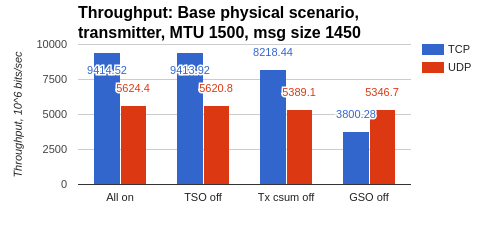
- Enabling offloads on a transmitter with MTU 9000 gives 55% CPU performance gain for TCP and 11.6% for UDP with Tx checksumming and GSO giving the highest boost.
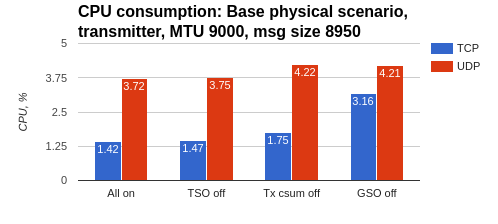
- Enabling offloads on a receiver with MTU 1500 gives 40% throughput gain for TCP and 11.7% for UDP with GRO and Rx checksumming giving the highest boost respectively.
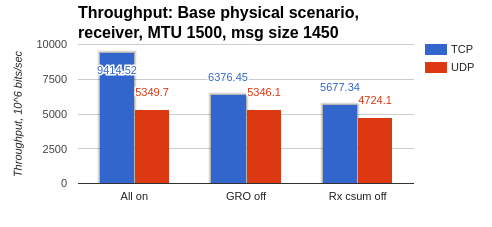
- Enabling offloads on a receiver with MTU 9000 gives 44% CPU performance gain for TCP and 27.3% for UDP with with GRO and Rx checksumming giving the highest boost respectively.
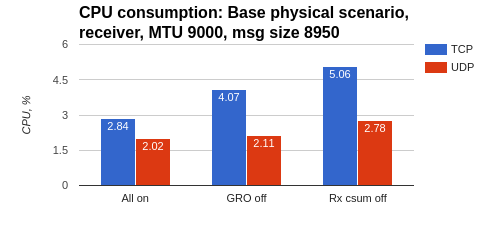
6.10.1.2. Baseline physical over VxLAN scenario¶
Similarly to baseline physical scenario, hardware offloads introduced a significant performance gain in terms of CPU usage and throughput both for the transmitter and the receiver. For TCP tests the effect was most noticeable on the receiver side while for UDP most significant improvement were achieved on the transmitter side.
- Enabling offloads on a transmitter with MTU 1500 gives 23.3% throughput gain for TCP and 7.4% for UDP with Tx checksumming and Tx UDP tunneling segmentation giving the highest boost.
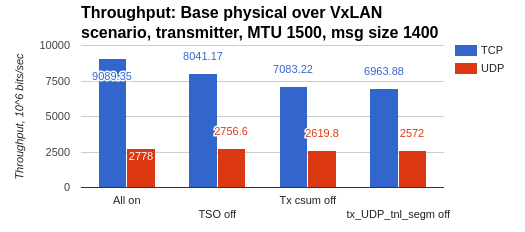
- Enabling offloads on a transmitter with MTU 9000 gives 25% CPU performance gain for TCP and 17.4% for UDP with Tx checksumming giving the highest boost.
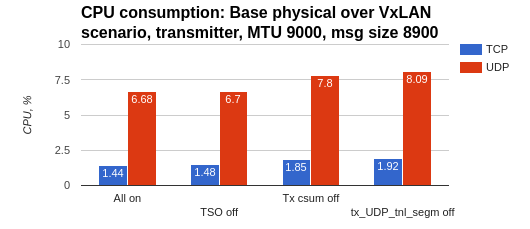
- Enabling offloads on a receiver with MTU 1500 gives 66% throughput gain for TCP and 2.4% for UDP with GRO giving the highest boost respectively.
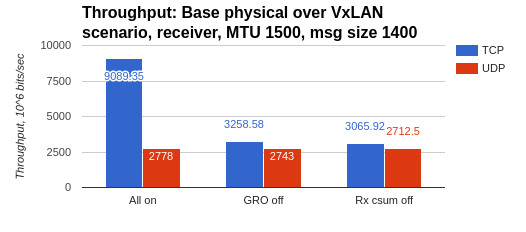
- Enabling offloads on a receiver with MTU 9000 gives 48% CPU performance gain for TCP and 29% for UDP with with GRO and Rx checksumming giving the highest boost respectively.
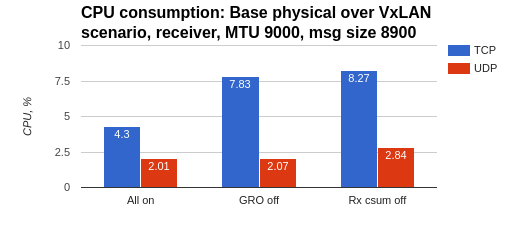
6.10.1.3. VM-to-VM on different nodes scenario¶
- Enabling Tx and TSO on the transmit side increases throughput by 44% for TCP and by 44.7% for UDP respectively.
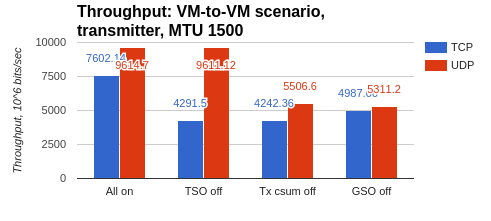
- Enabling GRO on the receive side increases throughput by 59.7% for TCP and by 61.6% for UDP respectively.
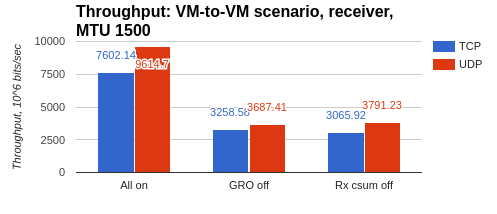
- CPU performance improvement is mostly visible on the transmitter with turning offloads off triggering total CPU consumption rising by 64.8% and 54.5% for TCP and UDP stream tests correspondingly.
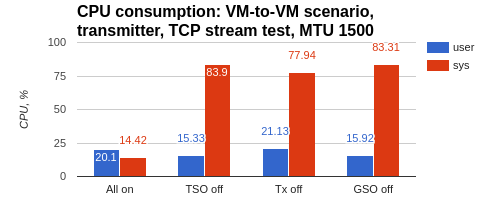
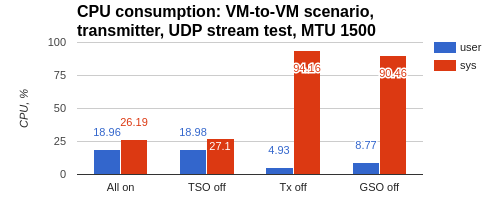
- Total CPU consumption on the receiver side in TCP stream tests does not change significantly, but at the same time turning offloads off leads to processes in user space taking more CPU time with system time decreasing.
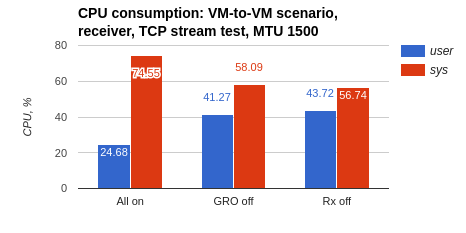
- In UDP stream tests user part of CPU consumption on the receiver drops by 3.5% with offloads on.
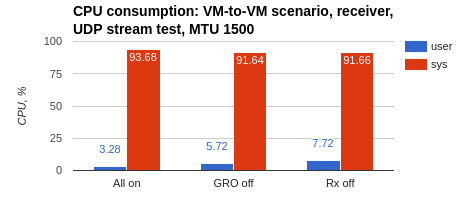
6.10.1.4. VM-to-VM on different nodes over VxLAN scenario¶
- Enabling Tx and TSO on the transmit side increases throughput by 35.4% for TCP and by 70% for UDP respectively.
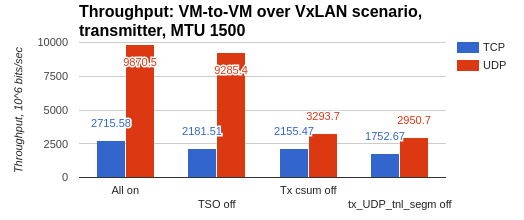
- Enabling GRO on the receive side increases throughput by 26% for TCP and by 4% for UDP respectively.
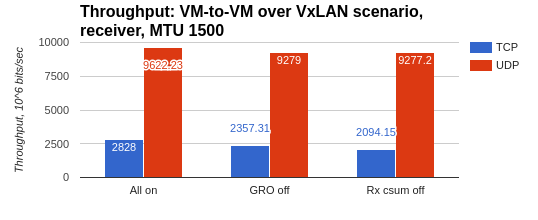
- CPU performance improvement is mostly visible on the transmitter with turning offloads off triggering total CPU consumption rise by 78.6% and 72.5% for TCP and UDP stream tests correspondingly.
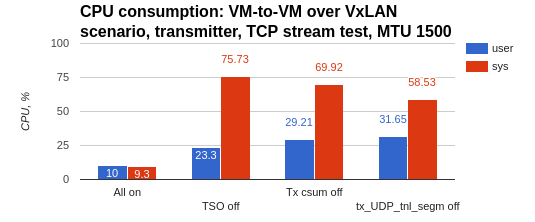
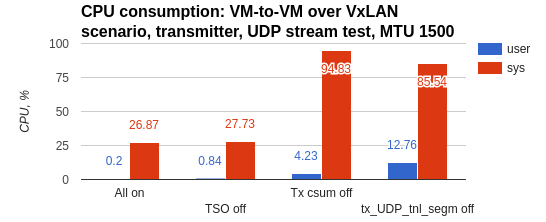
- Total CPU consumption on the receiver side in TCP stream tests does not change significantly, but at the same time turning offloads off leads to processes in kernel space taking more CPU time with user space time decreasing.
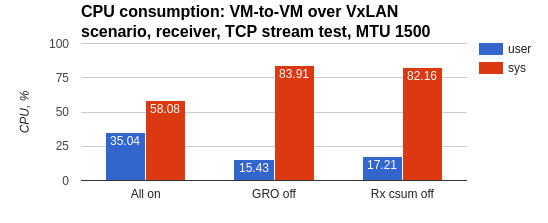
- In UDP stream tests user part of CPU consumption on the receiver drops by 7% with offloads on.
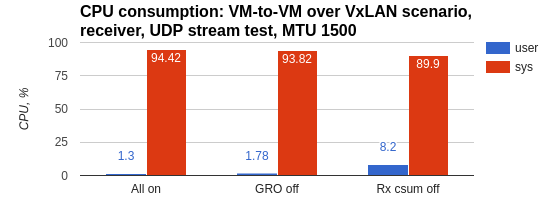
6.10.1.5. Summary¶
Network hardware offloads provide significant performance improvement in terms of CPU usage and throughput on both the transmit and receive side. This impact in particularly strong in case of VM-to-VM communication.
Based on testing results the following recommendations on using offloads for improving throughput and CPU performance can be made:
- To increase TCP throughput:
- Enable TSO and GSO (tx-udp_tnl-segmentation for VxLAN encapsulation) on transmitter
- Enable GRO on receiver
- To increase UDP throughput:
- Enable Tx checksumming on transmitter
- Enable GRO on receiver
- To improve TCP CPU performance:
- Enable TSO on transmitter
- Enable GRO on receiver
- To improve UDP CPU performance:
- Enable Tx checksumming on transmitter
- Enable Rx checksumming on receiver
Using kernel ver. 3.19 or higher and hardware capable of performing offloads for encapsulated traffic like Intel XL710 controller means that these improvements can be seen in deployments that involve VxLAN encapsulation.